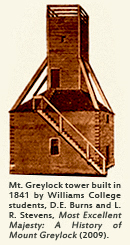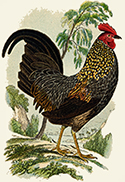
Explore Mount Greylock State Reservation. Visit Arrowhead, Herman Melville's house in Pittsfield. Learn more about Hawthorne and Melville's friendship at Hawthorne in Salem. Explore the Sterling and Francine Clark Art Institute in Williamstown. |
Mt. Greylock
Having reached the summit of the mountain at sunset, he did not glimpse the panoramic views that can be seen from the top until daybreak. He climbed the tower at first light and, as the sky brightened, found himself surrounded by clouds, cut off from the "trivial places we name Massachusetts or Vermont or New York," looking out, as he put it, toward "an undulating country of clouds, answering in the varied swell of its surface to the terrestrial world it veiled. It was such a country as we might see in dreams, with all the delights of paradise. There were immense snowy pastures...and shady vales between the vaporous mountains; and far in the horizon I could see where some luxurious misty timber jutted into the prairie, and trace the windings of a watercourse, some unimagined Amazon or Orinoko, by the misty trees on its brink." Thoreau was only one among many literary figures who drew inspiration from Mt. Greylock. While living at Arrowhead, his farm in Pittsfield, between 1850 and 1863, Herman Melville could see the mountain from the window of the study where he completed Moby Dick. During this period, he met Nathaniel Hawthorne on an excursion to Monument Mountain, and the two struck up an intense friendship that inspired Melville to dedicate Moby Dick to Hawthorne in "admiration for his genius." Hawthorne was then renting a house in a few miles away in Lenox, having moved to the Berkshires from Salem. A few years earlier, from 1842 to 1845, he and his wife, Sophia Peabody Hawthorne, rented the Old Manse in Concord. During this period, they socialized with Emerson, Thoreau, and the Alcotts without ever quite placing themselves within the Transcendentalists' circle. Thoreau, who had planted a garden for the Hawthornes upon their arrival at the Old Manse, visited them in Salem when he gave two of his early Walden lectures there in 1848 and 1849, but he apparently never met up with them in the western part of the state. We have yet to find evidence that Thoreau ever met Melville, but we do know that Melville developed an interest in Thoreau's work when he borrowed a copy of A Week on the Concord and Merrimack Rivers in 1849 just before moving to Pittsfield and forming a bond with Hawthorne. On a visit to Arrowhead, where Hawthorne and Melville reportedly used the barn as a refuge from the crowded house, Hawthorne is said to have joked that he and his host ought write a book entitled "A Week on a Work-Bench in a Barn," a quip that conveys his sometimes dismissive view of Transcendentalists in general and Thoreau in particular. Scholarly debate continues about further connections, centering mainly on whether Melville had Thoreau in mind in creating various characters including the wood-chopper in "Cock-A-Doodle-Doo!" (1853), Bartleby in "Bartleby, the Scrivener: A Story of Wall Street" (1853), and the Emersonian Egbert in The Confidence Man (1857). The notion that Thoreau inspired Melville to caricature Transcendentalism in "Cock-A-Doodle-Doo" is especially intriguing because it suggests, however faintly, that Melville might have heard him deliver his lecture on "Walking" since it featured a passage on the crowing of a cock that could have sparked Melville's satirical story of a remarkable bird that sings its owners happily into their graves. Another explanation for the apparent references to Thoreau in the story could be that Melville drew on Hawthorne's recounting of the two lectures that Thoreau gave in Salem since one of these could have included the tribute to the cock's crow in what later became the chapter on "Sounds" in Walden (1854). In "Cock-A-Doodle-Doo," the narrator becomes obsessed with a cock that belongs to Merrymusk, a woodchopper who lives in a dilapidated shanty in a swampy forest with his ailing family. In a somewhat Thoreauvian style, Merrymusk insists that he is rich in every respect on account of the joyful voice of his bird. Had he looked through Hawthorne's critical eye, Melville might have viewed the rhapsody that Thoreau offered up on the Chanticleer in Walden as an invitation to parody:
|













